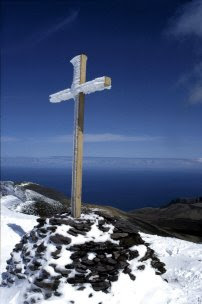Chet Raymo's work
Last night, round about 11:30, I finished reading Climbing Brandon, by Chet Raymo. There aren’t many books that keep me up past my bedtime, but Raymo never disappoints and I thought I’d mention his work here in the hopes of persuading a few of you to discover him, if you haven’t already.
Raymo is an essayist, science writer, fiction writer and philosopher, and author of the acclaimed column in the Boston Globe, “Science Musings,” which is also online at www.sciencemusings.com
which I follow avidly — note the link on the left. He is one of those rare writers of whom all my various friends approve, people of faith, scientists, clergy, agnostics and die-hard aetheists included.
I first discovered Raymo’s work when my Best Beloved and I were in Ireland, some many years ago, and while ferreting around in a bookshop in Cork, came upon the title, The Dork of Cork. Now, that would be a great title even if I wasn’t in Cork, but since I was, it proved irresistible. What a great delight to discover this novel, the story of Frank Bois, a dwarf, who lives in Cork, Ireland, who recounts his life with painfully raw humor while he pursues his passion for astronomy and the woman of his dreams. While I expected the humor, given the title, the depth of Raymo’s meditations on science, art, astronomy and love, were wonderful surprises, and I’ve been hooked ever since, on both his fiction (In the Falcon’s Claw), and nonfiction.
In terms of his non-fiction, Raymo writes much in the style of the renowned anthropologist, science writer, ecologist, and poet, Lorne Eisley (whose STAR THROWER I can’t recommend highly enough). Over the years, I have been consistently thrilled with the scope of Raymo’s curiosity and learning, but more than anything else, it’s Raymo’s beautiful prose, combined with his sense of awe,that keeps me coming back for inspiration. This book continues to impress. For example, “Knowledge is an island in an infinite sea of mystery; as the island grows, so does the shoreline along which we encounter the mysterious.”
His reverence for the natural world is contagious and as I read this book I feel I am walking beside a trusted, deeply knowledgeable guide and mentor, listening to him chat about the plants I’m seeing, the rocks under my feet, the salt on my lips, the wonders of the ocean before me, the living history all around me. He is a splendid guide, and one who inspires delight and awe in the marvels of creation.
In this book, he concentrates on the early Irish Christian philosophy of the immanence of God as opposed the the Roman concept of transcendence, and contemplates what the world might have been, and might yet be like, if we adopted, as the early Irish Christians did, a celebratory sense of God’s greatest revelation — creation itself — rather than asserting abstract dogma.
As always with Raymo, I come away with a new reading list as well – Columbanus, Augustine Hibernicus, John Carey, E.O. Wilson, Noel Dermot O’Donoghue, Marina Smyth… Like Anne Fadiman, who wrote the splendid book of essays, At Large and At Small, Raymo is one of those people I’d love to invite over for dinner and an evening of meandering, illuminating conversations. I never have contacted him and told him what a fan I am, but I just might. The Best Beloved encourages such things and he’s generally right.
All in all, a highly recommended read! And now I’m off to start When God is gone, everything is sacred, which Raymo published this year. I’m sure it will prove much more fun than The Family Cow, which I’ve been using for research on my new novel.
Copyright 2008 Lauren B. Davis For permissions: laurenbdavis.iCopyright.com


